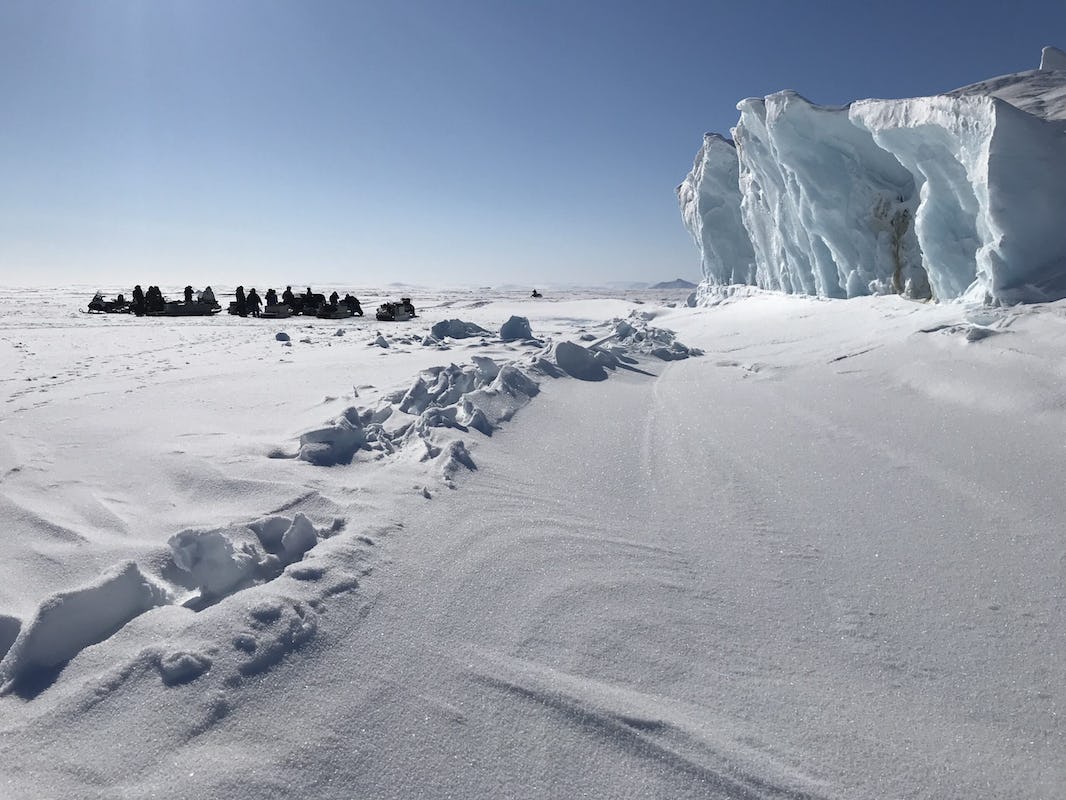Arctic Collaboration: The Arctic Institute’s Spring Series 2023

Arctic scientific and political collaboration has become complicated after Russia attacked Ukraine in February 2022. Photo: National Snow and Ice Data Center
The future of the Arctic is filled with uncertainty. While the outbreak of the coronavirus pandemic in the early 2020s had already made cross-border collaboration difficult in the Circumpolar Arctic, Russia’s attack on Ukraine in February 2022 led the other seven Arctic states (A7) to pause their participation in the Arctic Council’s meetings and subsidiary bodies altogether. Although A7 later decided to resume their regional collaboration without Russia’s participation, it is challenging to advance environmental protection and human security projects without the involvement of the largest Arctic state.
Although Russia’s war in Ukraine has not escalated to the Arctic, it has dramatically shaped the security situation in the region. As a response, the traditionally neutral states of Finland and Sweden applied for membership in NATO last year. Coupled with intensifying great power rivalry between the US and China, there are few prospects to continue to view the Arctic as an exceptional zone of peace, as portrayed by Mikhail Gorbachev in the late 1980s.
At the same time, climate change is accelerating, and temperatures rise several times faster in the Arctic than in other parts of the globe. The seven warmest years in the Arctic since 1900 have been the past seven years. The melting of ice and snow, soaring temperatures, rising sea levels, contamination and acidification of the ocean, and increased human activity cause unprecedented stress for the unique Arctic terrestrial, marine, and other aquatic systems, leading to a significant decline in species richness and harming traditional ways of life of the many Arctic communities, both Indigenous and non-Indigenous.
Since the official contacts between Russia and seven other Arctic states have been minimized, political, economic, scientific, social, and cultural collaboration has become difficult at the regional level. Without international collaboration, however, complex global and regional problems cannot be solved, nor sustainable development and the well-being of local communities be fostered in the Circumpolar North.
The Arctic Institute’s 2023 Arctic Collaboration Series will include ten articles discussing the (future of) Arctic collaboration from various perspectives. We ask: How has Russia’s war on Ukraine impacted various forms of Arctic collaboration at the international, regional, and local levels? We also ponder how these forms of collaboration could be resumed in the future.
The Arctic Institute Collaboration Series: an outline
As the outbreak of the Russia-Ukraine war exacerbates many existing vulnerabilities in the Arctic, we begin our new series with critical perspectives on Arctic development and practices of colonization. In the first article, Marlene Payva Almonte explains how the war has made climate change mitigation even more complicated, undermining especially the traditional knowledge and lifestyles of Indigenous Peoples in the Arctic. Similarly, Elizabeth Moeser investigates dynamics that reproduce and perpetuate colonial power structures in Alaska, paying particular attention to resource development.
In addition to resource development and shipping, the Arctic is often described as a region of political dialogue and scientific collaboration. As mentioned above, the work of the Arctic Council has been paused. Russia’s Arctic neighbors, Finland and Norway, have also frozen research and educational collaboration with Russian universities and institutions. Based on his own experiences, Larry Ibrahim Mohammed analyzes the impacts of this decision on young people in the Arctic.
Then, we move to analyze the war’s impact on state policies and interstate collaboration in the Arctic. Chuan Chen explores Sino-Russian collaboration in the Arctic and analyzes how such collaboration may harm China’s long-term interests. Based on the analysis of the Congress Report of China’s latest National Congress held in October, Marco Volpe ponders the future priorities of China’s Arctic policy. Furthermore, Lena Debanck studies the Arctic role of the European Union in light of intensifying geopolitical tensions.
In the Arctic, practices of science diplomacy are often viewed as a functional tool to balance tensions and develop shared approaches to common problems. We have two contributions discussing (the future of) Arctic science diplomacy and the potential role of non-Arctic states in those practices. Ebru Caymaz focuses primarily on the potential mediator role of Türkiye in efforts to continue scientific collaboration in the Arctic. Karen van Loon, in contrast, suggests that Belgium could bring wide-ranging scientific expertise to the Arctic collaboration tables. Finally, Pavel Devyatkin asks: Can Arctic collaboration be restored? This is a crucial question in the region that can no longer be seen as a “pole of peace” but increasingly a “pole of instability,” not only in climatic but also in geopolitical terms.